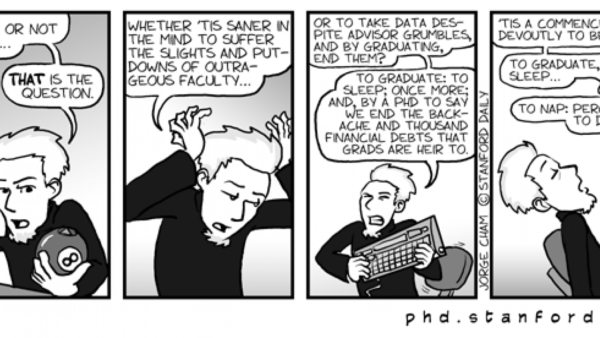What is a PhD degree good for? Why do some people do hard, underpaid work for three to five years, just to add three letters to their name? Can they not get the same job experience working as a research assistant? Let us investigate. At a first glance, there are a number of arguments advising against a PhD.
PhD students assume a lot of work and responsibility both in the lab and for teaching purposes. As with every new task, the time for doing the actual, productive research work within a PhD is shortened by both introductory training and postprocessing. From a purely economic point of view, there are many non-productive tasks during a PhD such as: Reading, getting acquainted with research methods, attending conferences and writing the final manuscript. PhD students are not granted a job certificate or possibly even a letter of recommendation in case of quitting. In this respect, a PhD position is inferior to the one of a research assistant. Rather than providing exposure to the free market, universities seem to be a comfort zone where good students can hang out for another three to five years. You need to subscribe for the entire period, settle for low pay and accept that your occupation will not be counted as work experience on the job market if you don’t see it through to a successful end. Since quitting your PhD can be perceived as a personal failure, this is a rather scary job description.
On the other hand, there are a number of arguments speaking in favor of striving for a PhD thesis.
In contrast to the work of a research assistant, a PhD student enjoys the privilege of doing basic research independent of a marketable product, encouraging the student to focus on his professional development towards scientific excellence. As part of a higher education, the concept of a PhD differs fundamentally from a position as a research assistant, hence the name student. PhD students do much-needed in depth reading and evaluation of the scientific literature. This intense and time-consuming immersion into the body of literature would not be possible with the narrower guidelines and more near-term focus of a research assistant. And professors cannot fulfill this task either: Apart from their research and teaching efforts, the attention of professors is being deflected towards an increasing number of chores in administration, public relations and the repeated application for funds. Hence, profound literature review is one of the PhD students' crucial tasks and should be regarded as such. For a PhD student the pursuit of a self-imposed research goal fosters the development of independent thought, personal responsibility, autonomy, focus and successful time management. He has to learn to cope with the insecurity when attempting to solve a new problem. And he has to prioritize between a multitude of parallel tasks. Personalities with traits like this are highly sought after in the current job market. Although these skills are nurtured in any research-related job, the freedom and responsibility of a PhD student is especially well suited to develop such traits. The fact that some well-paid positions in big tech companies are held by PhDs supports for the conclusion, that industry does in fact recognize the valuable work experience a PhD has to offer.
In conclusion, why are PhDs necessary?
It is not only about the responsibility and efficiency in the lab.It is also about the exceptional privilege of doing independent research.
It is not only about the submission and defense of a PhD thesis.It is also about the badly needed evaluation of scientific literature.
It is not only about the three-letter extension of your name.It is more about learning how to be an impartial and skeptical researcher.And such people are direly needed both in the research community and in society at large.
Rather than abolishing the PhD for lack of appreciation granted by the job market, I vouch for its recognition as a bold move of a curious mind. PhDs can inspire us to expand our narrow focus on money making towards the broader goal of pursuing scientific knowledge and improving our understanding of the world.
Die Beiträge auf dem Reatch-Blog geben die persönliche Meinung der Autor*innen wieder und entsprechen nicht zwingend derjenigen von Reatch oder seiner Mitglieder.


Comments (0)